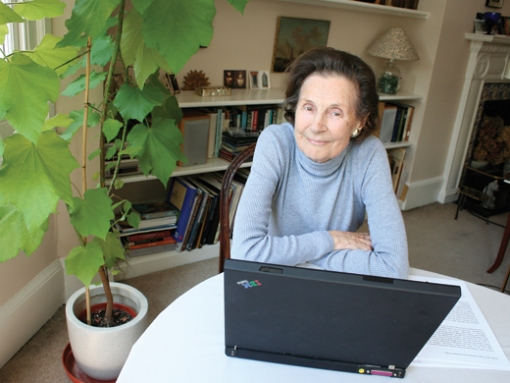Home >> Reviews >> Books >> 2010 >> Jun >> Books: Review - Are They Funny, Are They Dead? By Marjorie Ann Watts
Books: Review - Are They Funny, Are They Dead? By Marjorie Ann Watts

Published: 10 June, 2010
Confounding publishers’ ageist attitudes, Marjorie Ann Watts, now in her early 80s, is finally doing the thing she loves best – writing fiction for adults, writes Ruth Gorb
LATE-flowering writers have become something to celebrate. Book-lovers delighted in the novels of Mary Wesley and Molly Keane, both bestsellers when in their 70s, and there is Diana Athill, still writing her incomparable memoirs in her 90s.
Now we have Marjorie Ann Watts, slim, energetic, unbelievably in her early 80s, and the author of a remarkable collection of short stories. Highly praised by the literati, the stories are sometimes amusing, sometimes moving, always elegantly written.
They are the author’s first published work for adults. Not for want of trying, she says wryly: “When I took my short stories to a publisher, they told me I could only have short stories published after I’d produced a novel. So I wrote a novel. They really liked it, but told me I was too old – I didn’t have a three-book deal in me.”
Breathtaking ageism which is their loss. Her writing is both beautiful and spare, immediately gripping, and has the rare quality of revealing a character in a few words. “How Things Turn Out”, the story of a tycoon’s flawed relationship with his children, starts: “Lord Porter had married young and then forgotten about it. He supposed he had loved his wife, he had never given it much thought.” In “Birthdays” (which won a literary prize), the entire tragedy of one woman’s life is there in a few domestic exchanges over the breakfast table. In “Christmas Eve” the reader can feel the bustle of a London street and recognise immediately the appearance of the young bag lady, quite simply, in her “red legs”. She was a real Hampstead character, just as the story of dotty Mrs Calder was inspired by a walk through Hampstead churchyard, round the corner from where Marjorie Ann Watts lives.
She observes, she remembers, she takes bits of her own life: “I use everything – no holds barred – and make a form out of the bits.”
She has been in the world of books all her life, although she started her career writing children’s books; the best known, The Mill House Cat, went into three editions and was read on TV by Jenny Agutter. She illustrated the books herself, having trained as a painter at Chelsea School of Art where she studied with Edward Ardizzone and was taught life drawing by Henry Moore.
Her grandmother was CA Dawson Scott, known as Sappho, who wrote 20 novels but whose greatest achievement was the founding of P.E.N., the international writers’ organisation. She was, says her granddaughter, rather grumpy and spent her last days living in a bell tent in Cornwall.
Sappho’s daughter, the redoubtable Marjorie Watts, brought up three children on her own (her husband, the artist Arthur Watts, died in a plane crash when Marjorie Ann was eight) with very little money, trained as a probation officer when she was 50, and wrote her mother’s biography when she was 87.
A daunting female line, therefore, and Marjorie Ann Watts has inherited both the feistiness and the talent. She did not fit into conventional schools, made a habit of running away, and it wasn’t until she went to art school that she found not one métier, but two. “I used to draw, and write in the margins of my drawings,” she says. “It was like a door opening.”
She taught art at a school, worked as an art editor, became an illustrator and a successful children’s writer. But all along, between other jobs and having a family, she was writing short stories. “I discovered it was something I loved,” she says. “I imagine it as a pond; there is suddenly a little movement, and underneath is a whole world.”
It is a great joy to have the stories published, she says; her courageous, fierce mother would have been very proud of her. Yes, there are more stories to come, and yes, she is finding writing hard now: “ But I love it. I feel a whole person when I’m doing it – and not when I’m not.”
• Are They Funny, Are They Dead? By Marjorie Ann Watts. CB Editions, £7.99




Comments
Post new comment